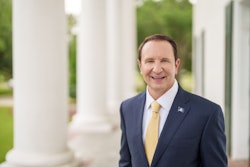Business School Firings Latest FAMU Controversy
By MARLON A. WALKER
Florida A&M University has been a mainstay in the headlines recently, but for all the wrong reasons: fired instructors; inaccurate budget accounts; nearly two years without a permanent president.
As the dark clouds surrounding the nation’s largest historically Black university continue to build, university officials say they are focused on the job at hand — stabilizing the university after years of mismanagement and preparing for the transition to a new leader after 18 months under the leadership of interim president Dr. Castell Bryant.
“We know Dr. Bryant is working hard to take the university to the next level for whatever time she is the president,” says university spokeswoman LeNedra Carroll.
FAMU officials say the recent firing of eight instructors from the School of Business and Industry (SBI) was part of a restructuring strategy to gain separate accreditation for the internationally renowned program.
The firings were rescinded at a FAMU board of trustees meeting in late June, but some speculate it is only a matter of time before the instructors disappear again.
Some faculty members have charged that the dismissals in late May were wrong and lacked the appropriate protocol.
“While we don’t object with the university wanting to get accreditation, [for SBI] to take this Draconian move … wasn’t necessary,” says Dr. Bill Tucker, a physics professor and president of the FAMU chapter of the United Faculty of Florida.
The business school instructors are an integral part of SBI’s acclaimed Professional Development Program. The program stood out as a unique tool when founded by former dean Sybil Mobley to give her students more hands-on experience and make them more marketable throughout the industry.
Officials recently announced the appointment of Dr. Lydia A. McKinley-Floyd as the new dean of SBI. She is expected to take over in the middle of this month. But in the meantime, interim dean Patrick Liverpool says the school needs to diverge from its original mission. The firings, he says, are the first step toward restructuring the program to get the school in line with the standards of the recognized accrediting body, the American Assembly of Collegiate Schools of Business.
“When professional development was initiated by Dean Mobley, that was unique,” says Liverpool, who has run the school since the beginning of 2006. “But everyone else is now doing professional development, so the competitive edge we had … is no longer a major drawing card. We have to find a different marketing niche.”
But, Tucker contends, the way the university’s administration is going about making the changes is unacceptable. He says the firings — the instructors were given five days notice to clean out their offices — violated the university’s collective bargaining agreement, which is why trustees rescinded the dismissals.
“The move was so sharp in not giving notice that was needed,” Tucker says. “Now, they’re regrouping to see whether they can have it both ways.”
As of now, all eight instructors are on the school’s payroll, although they are not currently working.
While many are concerned that SBI is losing the unique curriculum the school was founded on, Liverpool says it is time the changes are made.
“It’s tough for anyone coming in here after Dean Mobley making changes,” he says. “Any change is somewhat sacrilegious. But changes need to be made.”
FAMU has been beset recently with legal, ethical and administrative problems. A recent state audit found that the school was unable to adequately account for how it handles its $398 million budget. An internal auditor was placed on leave when he launched an investigation of administration officials. And the board recently authorized an investigation into whether top administrators have beenmisrepresenting the university’s financial standing.
Dr. Alvin Bryant, president of the school’s national alumni association and no relation to the interim president, says those issues would not be present if a new president were in place.
“This is our best chance of getting problems corrected at the university,” Bryant says. “We need a highly qualified individual who knows how to multitask and … diagnose the deficiencies at the university and go about fixing them.”
The board recently hired The Hollins Group, a search firm from Chicago, to find a permanent president by August 2007.
That’s still slower than some believe it should happen.
“They’ve been working as a go-slow approach,” Tucker says. “I still think there’s efforts to slow it down. [The board] wants to keep Castell Bryant in there longer than some of us want.”
And as damaging stories about the university’s inadequacies continue to surface, student enrollment continues to fall. The incoming class for the fall of 2005 was 12,187 students, down from 13,063 at the same time in 2004. Tucker says he believes there are still more than 10,000 students at the university, “but with so much uncertainty, I don’t know.”
© Copyright 2005 by DiverseEducation.com


















